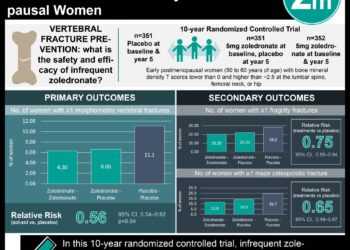Glucagon-like peptide-1 receptor agonists and co-agonists safe and effective for weight loss
1. In this systematic review, glucagon-like peptide-1 receptor agonists and co-agonists were effective in inducing weight loss in overweight adults who were otherwise healthy and did not have diabetes.
2. Glucagon-like peptide-1 receptor agonists and co-agonists were associated with mild-to-moderate, transient gastrointestinal side effects.
Evidence Rating Level: 1 (Excellent)
Study Rundown: Glucagon-like peptide-1 (GLP-1) receptor agonists are a class of medications initially developed to treat type 2 diabetes. They stimulate the pancreas to increase insulin secretion and suppress glucagon, helping to control blood glucose levels. GLP-1 receptor agonists have been shown to induce significant weight loss in individuals with obesity, particularly due to their effects in reducing appetite and delaying gastric emptying. The United States Food and Drug Administration currently approves injectable liraglutide, semaglutide, tirzepatide as GLP-1 agents for weight management, and there has been ongoing research exploring the use of dual and triple co-agonist agents for enhanced weight management. Hence, this systematic review identified and assessed placebo-controlled, randomized controlled trials (RCTs) to determine the efficacy and safety of GLP-1 receptor agonists and co-agonists for the treatment of obesity in adults without diabetes. A total of twelve GLP-1 agents (three commercially available and nine premarket) were included. Overall, GLP-1 receptor agonists and co-agonists were effective in inducing weight loss and were associated with mild-to-moderate, transient gastrointestinal side effects including nausea, vomiting, constipation and diarrhea. No serious gastrointestinal side effects such as bowel obstruction or gastroparesis were reported. The systematic analysis was limited by a lack of head-to-head RCTs comparing the GLP-1 agents and by the lack of standardization in lifestyle interventions employed across the various RCTs which may have impacted weight loss outcomes. In summary, these findings supported the use of GLP-1 agents for the treatment of overweight or obesity in otherwise healthy adults.
Click to read the study in AIM
Relevant Reading: Role of glucagon-like peptide-1 receptor agonists in achieving weight loss and improving cardiovascular outcomes in people with overweight and obesity
In-Depth [systematic review]: This systematic review investigated the efficacy and safety of various GLP-1 agonists and co-agonists for the treatment of overweight and obesity in otherwise healthy individuals without diabetes. MEDLINE (via PubMed), Embase (via Ovid) and Cochrane CENTRAL databases were searched from their inception to October 4, 2024 to identify relevant placebo-controlled RCTs. Adults who were overweight (body mass index (BMI) of 27 kg/m2 or greater with 1 or more weight-related comorbidity) or obese (BMI of 30 kg/m2 or greater) without other co-morbidities were included. The primary outcome was a change in relative or absolute body weight from baseline to maximum follow-up. Safety outcomes included death, serious adverse events, any adverse events, and gastrointestinal adverse events. A total of 5,152 publications were screened and 26 RCTs (15,491 participants) were included. The median treatment period ranged from 16 to 104 weeks with a median of 43 weeks. The mean ranged from 30 to 41 kg/m2 and 72% of the participants were female. Of the commercially-approved agents, tirzepatide (15 mg subcutaneous once weekly) resulted in a weight loss of up to 17.8% (95% confidence interval [CI], 16.3% to 19.3%) after 72 weeks, semaglutide (2.4 mg subcutaneous weekly) resulted in a weight loss of up to 13.9% (95% CI, 11.0% to 16.7%) after 68 weeks, and liraglutide (3.0 mg subcutaneous once daily) resulted in a weight loss of up to 5.8% (95% CI, 3.6% to 8.0%) after 26 weeks compared to placebo. Of the 9 premarket agents, retatrutide (12 mg subcutaneous once weekly), a triple agonist, exhibited the greatest weight loss up to 22.1% (95% CI, 19.3% to 24.9%) after 48 weeks, although the other novel agents also exhibited varying levels of efficacy. Adverse events were more common with GLP-1 agents compared to placebo but were mainly mild-to-moderate gastrointestinal side effects (47% to 84% vs. 13% to 63%). Serious adverse events were rare. In summary, this systematic review demonstrated that GLP-1 receptor agonists and co-agonists are safe and effective for weight loss in adults with overweight and obesity who are otherwise healthy.
Image: PD
©2025 2 Minute Medicine, Inc. All rights reserved. No works may be reproduced without expressed written consent from 2 Minute Medicine, Inc. Inquire about licensing here. No article should be construed as medical advice and is not intended as such by the authors or by 2 Minute Medicine, Inc.


![Active smoking cessation intervention may provide tangible results [Project CLIQ]](https://www.2minutemedicine.com/wp-content/uploads/2014/12/smoking-e1418644951268-350x250.jpg)




